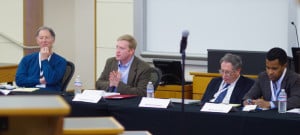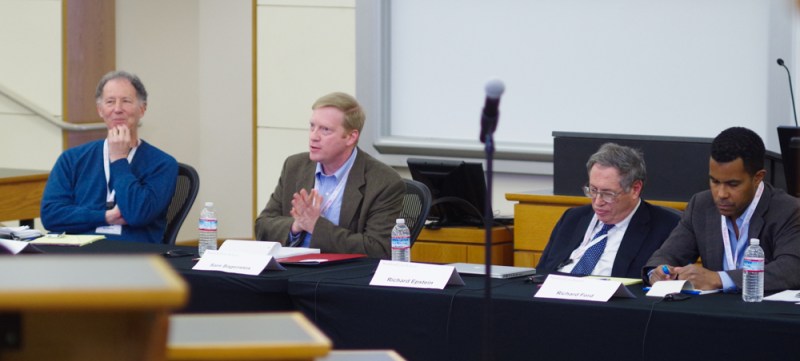
This weekend, The Stanford Law Review and the Stanford Journal of Civil Rights and Civil Liberties hosted “The Civil Rights Act at Fifty,” a symposium celebrating the 50th anniversary of the Civil Rights Act of 1964.
The symposium, held in the Law School, featured an array of panels and talks focused around the history of the civil rights movement and the state of civil rights in the country today.
Friday night featured a panel on the history of the Civil Rights Act of 1964, with speakers from the Martin Luther King, Jr. Research and Education Institute at Stanford University, the University of Virginia School of Law and the Stanford Law School.
Following the panel was a talk given by Eva Paterson, president and founder of the Equal Justice Society—an organization dedicated to changing the law through progressive legal theory, public policy and practice.
For Paterson, the symposium and the panels were not only a chance to talk about the history of the Civil Rights Act of 1964, but also an opportunity for “thinking about where we are, where we’re going and where we’ve been.”
“I think we should all take this opportunity to deepen our understanding of our history, through these discussions and panels,” Paterson said, adding that pop culture is useful for better understanding our history.
Paterson said that it is important to understand the factors that led up to the Civil Rights Act, and in particular the events that were driving people to resist racism. She cited the episode on June 11, 1963 when Alabama Governor George Wallace blocked the University of Alabama entrance to black students James Hood and Vivian Malone Jones and how that event eventually led to the March on Washington.
“It’s very important to understand what was fueling people and why a quarter of a million people showed up in Washington, D.C., on August 28, 1963,” she said.
Paterson added that today the country is not a post-racial society, as issues of racism still permeate society today, including racially biased ads negatively depicting the Obama family, the shooting of young black men because of a subconscious bias against black faces and race-conscious voting rights laws that prevent certain people from voting.
Saturday featured four more panels, focused on topics such as sex, gender and sexuality in civil rights, and the changing tides of the enforcement of the Civil Rights Act. A panel of three legal scholars discussed employment discrimination and freedom of association.
Richard Ford ‘88, a professor of civil rights and antidiscrimination at Stanford Law, commented on the importance of understanding true intent in employment discrimination cases, as someone could be an incompetent employee yet claim discrimination as a result of their loss of job.
On the other hand, employers have to follow the duty of making decisions that do not perpetuate preexisting social inequalities, according to Ford.
Richard Epstein, the Laurence A. Tisch professor of law at the NYU School of Law and a senior fellow at the Hoover Institute, and Samuel Bagenstos, professor of law at the University of Michigan Law School, both talked about public accommodation laws and recent freedom of association civil rights issues.
Specifically, Bagestos cited the “Boy Scouts of America v. Dale” case in 2000, in which it was determined that the Boy Scouts, as a private organization, were allowed to exclude members based on certain criteria because the presence of that person would affect the group’s ability to advocate their viewpoints.
The symposium ended with a closing reception at the Law Lounge on Saturday afternoon.
Contact Josee Smith at jsmith11 ‘at’ stanford ‘dot’ edu.
